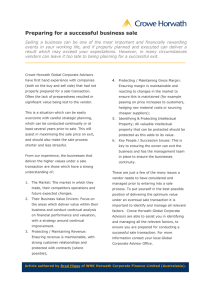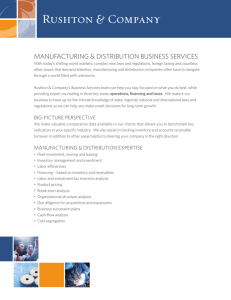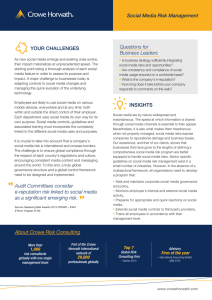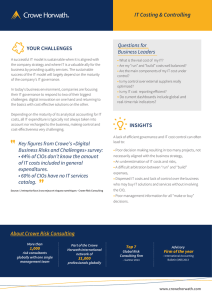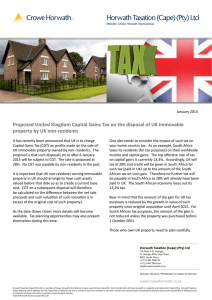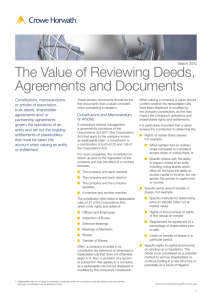In This Issue: Added Tax (“VAT”) on its Export
advertisement
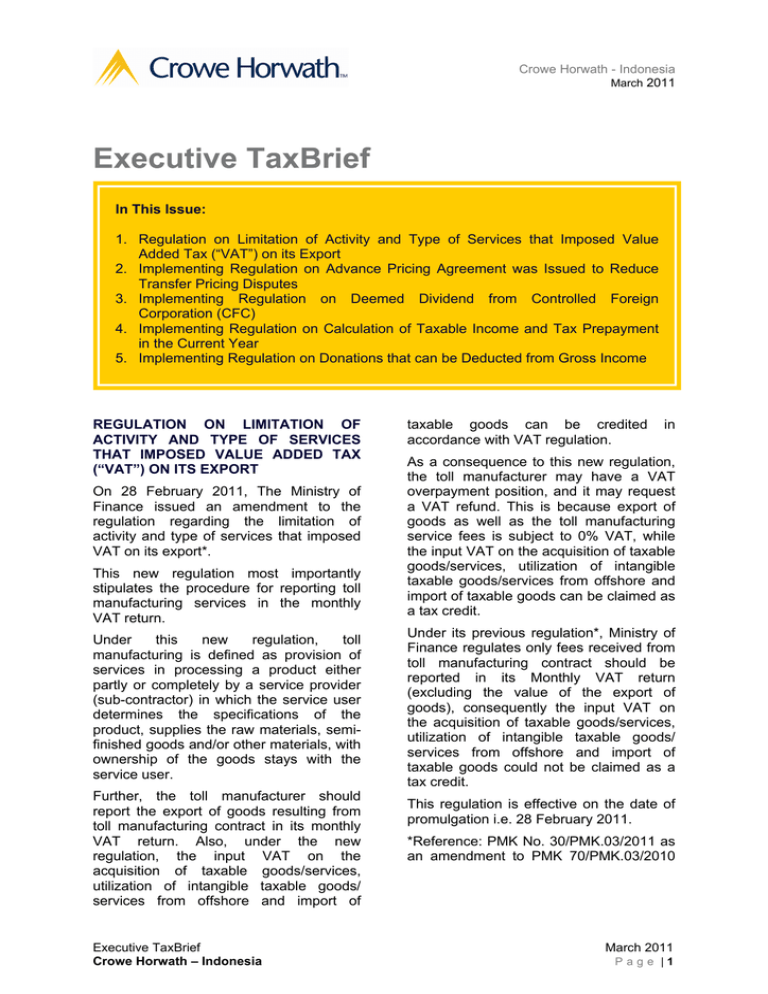
Crowe Horwath - Indonesia March 2011 In This Issue: 1. Regulation on Limitation of Activity and Type of Services that Imposed Value Added Tax (“VAT”) on its Export 2. Implementing Regulation on Advance Pricing Agreement was Issued to Reduce Transfer Pricing Disputes 3. Implementing Regulation on Deemed Dividend from Controlled Foreign Corporation (CFC) 4. Implementing Regulation on Calculation of Taxable Income and Tax Prepayment in the Current Year 5. Implementing Regulation on Donations that can be Deducted from Gross Income REGULATION ON LIMITATION OF ACTIVITY AND TYPE OF SERVICES THAT IMPOSED VALUE ADDED TAX (“VAT”) ON ITS EXPORT On 28 February 2011, The Ministry of Finance issued an amendment to the regulation regarding the limitation of activity and type of services that imposed VAT on its export*. This new regulation most importantly stipulates the procedure for reporting toll manufacturing services in the monthly VAT return. Under this new regulation, toll manufacturing is defined as provision of services in processing a product either partly or completely by a service provider (sub-contractor) in which the service user determines the specifications of the product, supplies the raw materials, semifinished goods and/or other materials, with ownership of the goods stays with the service user. Further, the toll manufacturer should report the export of goods resulting from toll manufacturing contract in its monthly VAT return. Also, under the new regulation, the input VAT on the acquisition of taxable goods/services, utilization of intangible taxable goods/ services from offshore and import of Executive TaxBrief Crowe Horwath – Indonesia taxable goods can be credited accordance with VAT regulation. in As a consequence to this new regulation, the toll manufacturer may have a VAT overpayment position, and it may request a VAT refund. This is because export of goods as well as the toll manufacturing service fees is subject to 0% VAT, while the input VAT on the acquisition of taxable goods/services, utilization of intangible taxable goods/services from offshore and import of taxable goods can be claimed as a tax credit. Under its previous regulation*, Ministry of Finance regulates only fees received from toll manufacturing contract should be reported in its Monthly VAT return (excluding the value of the export of goods), consequently the input VAT on the acquisition of taxable goods/services, utilization of intangible taxable goods/ services from offshore and import of taxable goods could not be claimed as a tax credit. This regulation is effective on the date of promulgation i.e. 28 February 2011. *Reference: PMK No. 30/PMK.03/2011 as an amendment to PMK 70/PMK.03/2010 March 2011 Page |1 Crowe Horwath - Indonesia March 2011 IMPLEMENTING REGULATION ON ADVANCE PRICING AGREEMENT WAS ISSUED TO REDUCE TRANSFER PRICING DISPUTES On December 31, 2010 the Directorate General of Taxes (DGT) issued the longawaited implementing regulation for the issuance of advance pricing agreement (APA) unilaterally between a taxpayer and the DGT*. APA determines the prices of transactions concluded by a taxpayer with other parties having special relationship (transfer pricing) which had been a frequent source of disputes between taxpayers and the DGT during a tax audit. Once agreed, APA will be applicable prospectively for 3 years. On certain conditions, APA may be applicable retroactively for 1 year prior to the year it was signed. Unlike transfer pricing documentation which is mandatory, APA is optional to taxpayers. On the positive note, this implementing regulation shall provide more certainty to the taxpayers with special - relationship transactions by resolving any potential transfer pricing issues in advance of a tax audit in a less confrontational environment. This new regulation also provides clarity in terms of administrative steps for preparation, discussion, issuance as well as evaluation of APA. However, the DGT may cancel APA on certain conditions such as change in the critical assumptions which could affect methods in determining transfer pricing. APA does not lift all the risks during a tax audit as it does not prevent the DGT from conducting a tax audit on the transfer pricing transactions. *Reference: PER-69/PJ/2010; Income Tax Law article 18 (3a) Executive TaxBrief Crowe Horwath – Indonesia IMPLEMENTING REGULATION ON DEEMED DIVIDEND FROM CONTROLLED FOREIGN CORPORATION (CFC) The Directorate General of Taxes (DGT) recently issued an implementing regulation for reporting of deemed dividend from controlled foreign corporation (CFC) by a domestic taxpayer in its income tax return*. Under the Ministry of Finance (MOF) Regulation previously issued in 2008*, qualifying shareholders are deemed to receive dividends from their CFC if they holds equity participation, whether individually or in conjunction with other domestic taxpayers, of at least 50% of the total paid-up shares of a non-listed foreign business entity. Qualified Indonesian companies with CFC need to recognize dividend in its annual income tax return based on the after-tax profit of the CFC in proportion to its share ownership percentage regardless of whether the CFC distributes dividends or retains its profit. In more details, this new implementing regulation from DGT determines the timing, the basis in calculating the amount, the utilization of foreign tax credit as well as the procedures for reporting the dividend deemed. *Reference: PER-59/PJ/2010; PMK 256/PMK.03/2008 March 2011 Page |2 Crowe Horwath - Indonesia March 2011 IMPLEMENTING REGULATION ON CALCULATION OF TAXABLE INCOME AND TAX PREPAYMENT IN THE CURRENT YEAR With a purpose to stimulate foreign direct investment into the country, The Government of Indonesia recently issued a regulation regarding the calculation of taxable income and tax prepayment in the current year*. This regulation stipulates among others: Tax facilities in the form of net income reduction, accelerated depreciation, import duty exemption, investment allowance, land and building tax reduction can be given to the taxpayers who enter capital investment as “industry pioneer”. Industry pioneer is defined as large scale industry, providing significant added values; introduce new technologies and having strategic value for the national economy. Non-interest bearing loan from shareholder is allowed under the following conditions: The capital to be paid by the shareholders providing the loan has been paid fully; The shareholders providing the loan are not in a loss position; and The loan is sourced from the funds of the shareholders providing the loan (i.e. not from a third party); The company receiving the loan is experiencing financial difficulties for the continuation of its operations. Taxpayer is obliged to maintain a separate bookkeeping in case of it receives non-taxable income and/or income subject to final tax regime. IMPLEMENTING REGULATION ON DONATIONS THAT CAN BE DEDUCTED FROM GROSS INCOME The Government of Indonesia issued new regulation on December 31, 2010 regarding several donations that can be deducted from gross income for income tax calculation purposes*. Under this regulation, the donation are defined as donation in relation to the national disaster, research and development activities, educational facilities, sports development activities, social infrastructure for public use given to the appropriate authorities. Such donation can be deducted from gross income if the following conditions are met: Previous year corporate income tax return is not in a loss position; Donation does not cause loss on the fiscal year when the donation is given; Supported with legitimate evidence; Parties who receive donation have tax registration number, except for party which are non-subject to tax under the income tax law. The amount of donation that can be deducted from gross income is at the maximum of 5% from the previous year fiscal net income; meanwhile donations and development expenses between related parties are non-deductible. Donation may be in the form of cash or kind, except for social infrastructure for public use that can only be given in the form of facilities. This regulation becomes effective starting fiscal year 2010. *Reference: PP 93 Year 2010; Income Tax Law article 6 paragraph 1 letter i to m *Reference: PP 94 Year 2010; Income Tax Law Executive TaxBrief Crowe Horwath – Indonesia March 2011 Page |3 Crowe Horwath - Indonesia March 2011 Contact Information: Name Wilmar Sidabutar Army Djatiprasetya Serep H. Lumbantoruan Munir Ali E-mail wilmar.sidabutar@crowehorwath.co.id army.djatiprasetya@crowehorwath.co.id serep.lumbantoruan@crowehorwath.co.id munir.ali@crowehorwath.co.id Title Partner Director Director CEO Center for Investment and Business Advisory Member Crowe Horwath International st Cyber 2 Tower, 21 Floor Jl. H.R. Rasuna Said Blok X-5 Jakarta 12950, Indonesia Tel +62 (21) 2553 5699 Fax +62 (21) 2553 5698 www.crowehorwath.co.id Center for Investment and Business Advisory / Kosasih, Nurdiyaman, Tjahjo & Rekan is a member of Crowe Horwath International, a Swiss verein (Crowe Horwath). Each member firm of Crowe Horwath is a separate and independent legal entity. Center for Investment and Business Advisory / Kosasih, Nurdiyaman, Tjahjo & Rekan and its affiliates are not responsible or liable for any acts or omissions of Crowe Horwath or any other member of Crowe Horwath and specifically disclaim any and all responsibility or liability for acts or omissions of Crowe Horwath or any other Crowe Horwath member. © 2011 Center for Investment and Business Advisory / Kosasih, Nurdiyaman, Tjahjo & Rekan Executive TaxBrief Crowe Horwath – Indonesia March 2011 Page |4
